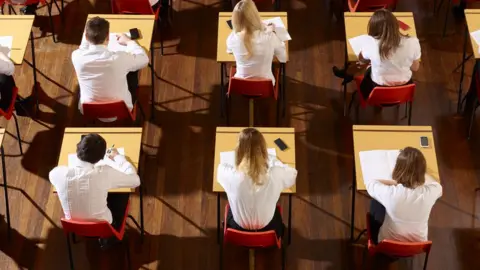Scotland's exams will test pupils - and ministers
 Getty Images
Getty ImagesScotland's school exam season is getting under way, with more than 132,000 candidates sitting National 5s, Highers and Advanced Highers over the next month.
Recent years have seen turbulence in Scottish education with concerns over falling standards and a failure to tackle the attainment gap.
Last year Education Secretary Jenny Gilruth said the results were "not good enough".
What's the problem?
Last year's marks fell to lower levels than before the Covid pandemic and international testing has suggested a long-term decline in Scottish educational attainment.
In addition to that, the gap between the results achieved by Scotland's richest and poorest school pupils is as wide as it was a decade ago when the government named it as a priority.
To tackle the problem, Ms Gilruth has pledged an increase in teacher numbers, further investment to reduce the time teachers spend in class, an ongoing reform of the curriculum and a focus on tackling poor behaviour in classrooms.
But plans to cut down on the number of exams pupils take have been largely rejected for now.
What can pupils expect?
This year's exam season will be very similar to the past few, with more than two million papers being handed out to pupils in silent school halls over the next month.
The first exams on Friday are computer science and psychology and the final subject will be Religious, Moral and Philosophical Studies (RMPS) on 30 May.
National 5s, mainly taken by S4 pupils aged 15 or 16, are offered in more than 50 subjects from accounting to Urdu.
Highers, often taken by 16 to 18-year-olds in S5 and S6, can be sat in a similar range of subjects while Advanced Highers offer fewer choices.
The Scottish government hopes that when pupils get their results on Tuesday 5 August they will show a marked improvement on last year.
What are the most popular subjects?
 Getty Images
Getty ImagesIn 2024 the most popular subjects at Higher were English, maths, physical education (PE), history and chemistry.
And the most popular Nat 5s were English, maths, applications of maths, biology and PE.
For Highers and Nat 5s there were more entries by girls than boys last year.
How will they be marked?
Teaching experts say this will be the first year of "normal" marking since the Covid pandemic.
What that means in reality will not be clear until results day.
During Covid-19, exams were cancelled for two years running and there was controversy when teacher estimates, previous coursework and a school's past performance were used to determine the results.
The results in 2020 saw the pass rate for Highers jump from 75% to 89%, while the percentage of pupils achieving A grades hit a record high the following year.
Since then the marking each year has been described as "generous", "sensitive" and "taking account of any impact on learners".
In a normal year, the pass rate for each grade is adjusted slightly but the average effect is small. In the years since the pandemic the adjustments have been more significant.
Despite the claim of consistent marking by the SQA last year, their approach to awarding grades in 2024 involved more significant adjustments to grade boundaries than usual.
Are exams on the way out?
Three years ago, in response to a number of concerns over Scottish education, Prof Louise Hayward was asked by the Scottish government to conduct a review of qualifications and assessment.
Her review recommended an end to S4 exams for students who were due to continue with a subject beyond that year.
It raised concerns about the so-called "two-term dash" with exams for some in the same subjects in S4, S5 and S6.
The review warned this too often results in teaching to the test rather than offering a broad understanding of the subjects.
 Getty Images
Getty ImagesGilruth told MSPs she agreed with the Hayward report's recommendation that there should be less reliance on "high stakes final exams" but last year the Scottish government rejected the proposals.
Instead, just a small number of practical subjects such as woodworking and cakemaking will drop exams next year and the rest will continue as they were.
Behind the scenes work is under way on the Curriculum Reform Cycle – with subjects including maths and English already under review.
To some this is considered a back door way of transforming the landmark Curriculum for Excellence without actually admitting it did not achieve what was intended.
Others have applauded the work under way.
In addition to the exams being sat over the next month, many other pupils will be completing National 1 to National 4 qualifications as well as other courses that are continually assessed throughout the year.
In total, more than 147,000 candidates are expected to get their results on Tuesday 5 August.
What's happening to the exams body?
There has been controversy over the Scottish Qualifications Authority (SQA) grading of exams in recent years, especially during the pandemic.
This will be the last year that students sit exams under the SQA before it is replaced later this year by a new body called Qualifications Scotland – as long as reforms going through the Scottish Parliament are not further delayed.
However, some have criticised this as a simple re-brand, as most of the staff will remain the same.
For those in exam halls the focus will be on the paper in front of them and nothing should feel any different.
For ministers, policy-makers and those working on reforming the curriculum, and the organisations setting exams and inspecting schools in the run up to an election next year, the challenge will be to bring about significant improvement - or face getting marked down.
